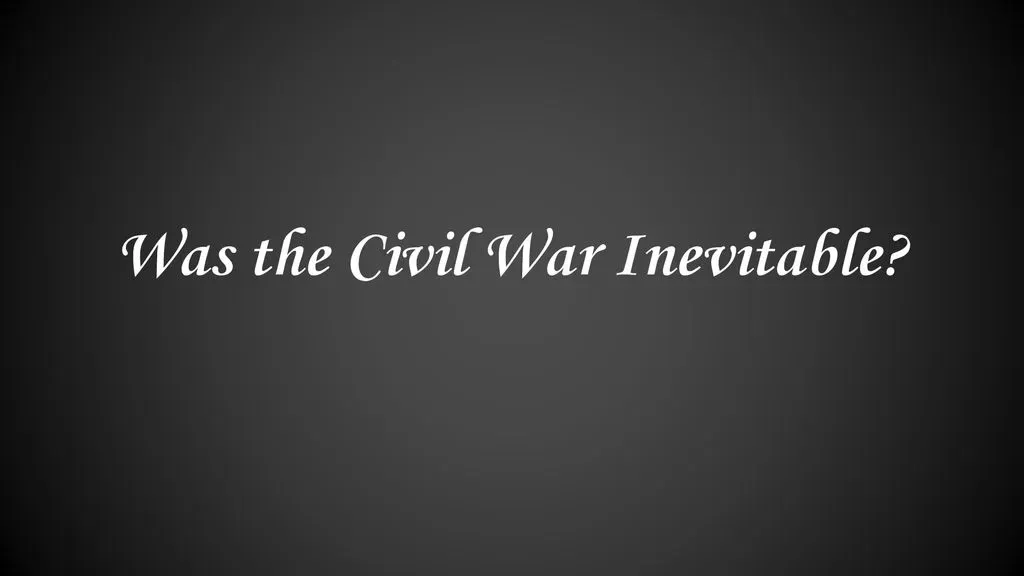The topic of Civil War inevitability sparks intense debate among historians, especially when considering the complex factors that contributed to the conflict. As America grappled with the contentious issues of slavery and states’ rights, many argue that the tensions were bound to culminate in war. President Abraham Lincoln famously faced the challenge of uniting a divided nation while trying to find a feasible slavery compromise. This period, rich in Civil War history, shows that despite numerous attempts at de-escalation, a definitive resolution remained elusive. Ultimately, the clash between Northern and Southern ideologies rendered the Civil War not just a possibility, but an almost certain outcome of the era’s profound discord.
The question of whether the American Civil War was unavoidable continues to be a topic of interest. As the nation confronted deep divisions over issues such as human bondage and regional sovereignty, alternative paths toward peace seemed increasingly unattainable. Lincoln’s efforts to navigate this treacherous political landscape revealed the intense polarization of the time. The failure of the ‘Peace Conference’ underscores how entrenched beliefs about slavery left little room for compromise, leading many to view the conflict as a tragic yet inevitable chapter in U.S. history. Analyzing these factors helps us understand how political polarization shapes national identity and the trajectory of history.
The Rise of Abraham Lincoln and the Question of Civil War Inevitability
The ascent of Abraham Lincoln to the presidency in 1860 marked a pivotal moment in Civil War history. His moderate stance on slavery and commitment to preserving the Union emerged during a time of heightened tensions and divisions between the North and South. While Lincoln may not have been a hard-core abolitionist, his clear rejection of slavery as a moral evil firmly placed him at odds with Southern interests. Lincoln’s election prompted immediate reactions from Southern states, leading to a series of secessions that raised the question of whether the Civil War was an unavoidable consequence of his presidency.
The concept of the Civil War’s inevitability stems from various factors, including Lincoln’s strong beliefs, the entrenched positions on slavery, and the failure of compromise efforts like the Peace Conference. Despite numerous attempts to bridge the divide, such as Lincoln’s correspondence with Southern leaders, the deep-rooted fears and frustrations on both sides often rendered meaningful dialogue impossible. Ultimately, Lincoln’s decision to prioritize the Union over any potential compromises laid the groundwork for the conflict that was about to erupt.
Frequently Asked Questions
Was the inevitability of the Civil War influenced by Abraham Lincoln’s actions?
Abraham Lincoln’s presidency and his stance on slavery significantly contributed to the Civil War’s inevitability. His belief that ‘a house divided against itself cannot stand’ underscored the impossible tension between slave and free states, making conflict increasingly unavoidable.
How did compromises related to slavery play a role in the Civil War’s inevitability?
Attempts to compromise, such as those proposed during the Peace Conference, ultimately failed to address the fundamental issue of slavery’s expansion into new territories. These unresolved tensions made the Civil War seem inevitable as both sides grew more entrenched in their positions.
What were Lincoln’s views on slavery, and how did they contribute to the Civil War’s inevitability?
Lincoln viewed slavery as morally wrong, famously stating, ‘If slavery is not wrong, nothing is wrong.’ His firm stance on limiting slavery’s spread rather than accepting its permanence created a conflict that made the Civil War seem unavoidable.
Why did the Peace Conference fail to prevent the Civil War?
The Peace Conference failed largely because it exposed the deep divides between North and South regarding slavery. Even though some concessions were offered, the fundamental discrepancies over extending slavery into new territories prevented any meaningful agreement.
Did Lincoln’s character influence perceptions of Civil War inevitability?
Lincoln’s character as a moderate and negotiator initially sought compromise, but as conflict escalated, his dedication to preserving the Union transformed the war into a moral cause, reinforcing the view that the Civil War was unavoidable.
What role did public perception of slavery play in the inevitability of the Civil War?
Public perception of slavery was polarized, with many Northerners increasingly seeing it as a moral issue. This shift in sentiment galvanized anti-slavery sentiments, making a peaceful resolution to the differences between North and South appear increasingly impossible.
How did fear influence the inevitability of the Civil War?
Fear played a significant role, particularly in the South, where the memory of events like John Brown’s raid fueled paranoia about slave uprisings. This heightened fear of emancipation led to a drastic and reactive stance among Southern leaders, facilitating the war’s inevitability.
What lessons about compromise can be drawn from the Civil War’s inevitability?
The Civil War illustrates that some conflicts may become too entrenched for compromise. The failed Peace Conference and the divergent paths of Northern and Southern states showed that avoiding difficult issues can lead to catastrophic consequences, making conflict seem inevitable.
How did Lincoln’s emphasis on Union change the narrative of the Civil War?
Lincoln’s emphasis on the Union shifted the Civil War narrative from one about preserving slavery to one about unifying a fractured nation. This transformation helped solidify the perception of an inevitable war over principles of democracy and unity.
Can studying Lincoln’s life provide insights into the inevitability of the Civil War?
Studying Lincoln’s life reveals his evolving views on slavery and governance, highlighting the struggle between personal conviction and political reality. His journey reflects how leadership in times of division can influence the inevitability of conflict.
| Key Points |
|---|
| Efforts to avoid war: Lincoln initially sought to find common ground with the South and avoid conflict. |
| The Willard Peace Conference offered a chance for compromise but ultimately failed due to fundamental disagreements. |
| Lincoln’s stance on slavery was firm, but he advocated for pragmatic solutions to preserve the Union rather than absolute abolition. |
| Public perception of war often portrays it as inevitable, despite the complex political and social landscapes leading to conflict. |
| The aftermath of the Civil War raises questions about the cost of conflict and whether it was worth the sacrifice of so many. |
Summary
The inevitability of the Civil War remains a deeply contested topic in American history. While many believe that the conflict was unavoidable, shaped by entrenched social and political divisions over slavery, it is essential to reflect on the missed opportunities for compromise. Lincoln’s attempt at reconciliation, particularly during the Willard Peace Conference, reveals the complexity of the era and suggests that different choices could have potentially altered the course of history. Ultimately, recognizing the multifaceted nature of the Civil War helps us understand its impact on present-day America, making the discussion of Civil War inevitability a crucial aspect of our historical narrative.



